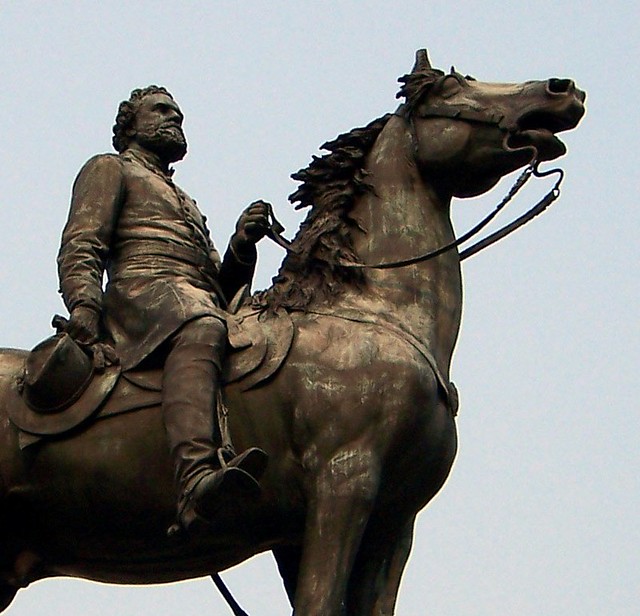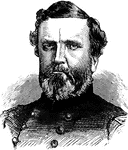He was born on a Virginia plantation and, as a young man,
received an appointment to the U.S. Military Academy at West Point. One of his
classmates, and a friend, was William Tecumseh Sherman. The young officer
served with distinction in the Mexican-American War where he was mentored by
Captain Braxton Bragg. Later, as a cavalry and artillery instructor at West
Point, one of his star students, J.E.B. Stuart was to become the one of finest cavalry and reconnaissance officers of the Civil War.
Lt. Col. Robert E. Lee was the academy superintendent at
West Point when J.E.B. Stuart was a cadet. The young officer, who was Stuart’s
mentor and served under Lt. Col. Lee at the time, would later become a Major
General in the Union Army during the Civil War. He was called a traitor by
J.E.B. Stuart, who wished him hung for treason against Virginia. All three of
the soldiers were sons of Virginia.
At the outbreak of the Civil War, many southern-born
officers struggled between loyalty to their home states and loyalty to the
Union Army, in which they had made their careers. George Henry Thomas was a private man, who
later in life destroyed all of his personal documents and papers. The son of a
slave-holding plantation owner, there is little record of his political position
at the time. However, it can be assumed that his marriage to a New York woman provided
some of the influence to his decision to remain in the Union Army.
Thomas advanced rapidly to the rank of Major General when
the Civil War started. However, he was not a man to hold his own lantern high.
More ambitious officers took advantage of this by taking glory for themselves
at the expense of General Thomas. General William T. Sherman is known to have spoken
highly of his West Point classmate at times but, for the most part, his loyalty
was toward General Grant. Sherman’s loyalty to Grant continued after the war when
the post war spotlight shined on the two men as heroes and helped
launch Grant to the presidency.
As Confederate Maj. Gen. Thomas Jackson earned the name
Stonewall Jackson at Second Manassas, so Union Maj. Gen. George Thomas later
became known as the Rock of Chickamauga. Having been driven from Chattanooga by
Union forces, Confederate Maj. Gen. Braxton Bragg was determined to retake the
strategic supply hub. On September 18, 1863, Maj. Gen. Bragg’s army skirmished
with Union forces at Chickamauga Creek.
Union Maj. Gen. William Rosecrans had been watching Bragg’s
army and anticipated an attempt to retake Chattanooga. On September 19 the
Confederacy was gaining ground but could not break through Union defenses. That
changed with the arrival, late that night, of Confederate Gen. James
Longstreet leading eight fresh brigades.
The next morning, using Longstreet’s additional strength,
Bragg launched a two-fronted attack on the Union lines. Thinking that his defenses
had been breached and fearing that his army would be routed, Rosecrans ordered
retreat. In the confusion, Maj. Gen. Thomas took the initiative to rally the
troops that he could find on the field and, with his own troops, took up a defensive
position while the rest of Union Army retreated to Chattanooga.
They held the lines until nightfall when Thomas and his army could retreat
back to Chattanooga under the cover of darkness. The battle resulted in extreme
losses on both sides but was decidedly a Confederate victory. In the end, the
Union held Chattanooga and the Confederacy held the high ground. However, if
not for the actions of the Rock of Chickamauga, in holding the lines against
impossible odds, the Union Army would likely have been routed and, thus, would have lost
Chattanooga.
After the war, up to 1869, Maj. Gen. Thomas commanded the Department
of the Cumberland in Kentucky and Tennessee. President Andrew Johnson offered
Thomas a promotion to the rank of lieutenant general with the intention of
replacing Grant as the general-in-chief. However, Johnson was a Democrat and
Grant was a Republican with his eye on the presidency. Thomas had no taste for
politics. He requested withdrawal from the nomination and asked for command of the
Military Division of the Pacific.
Maj. Gen. George Henry Thomas died of a stroke in 1870. His
remains were transferred from San Francisco back to New York. He is interred in
Troy, New York. Thomas was born a middle child among ten siblings on a Virginia
plantation in 1816. None of his blood relatives attended his funeral. Like
J.E.B. Stuart, they had never forgiven him for, what they considered to be,
treason against his native Virginia.


I would be wrong, but I think it was Gen Thomas who was at the meeting with Lee and Scott, which so many people claim Lincoln sent an offer to Lee to command the Union troops. According to Thomas -- if I remember correctly -- no such offer was made, in fact, Lee would not commit to which side he was on, during the meeting. Upon which Scott told him to go home and figure that one out, first.
ReplyDeleteFuthermore, while we all think Lee was some great commander, actually by 1860 he had never been in charge of combat troops. He was an engineer. His first "combat" experience was actually the arrest of John Brown, and even then, he arrived several hours late, in civilian clothes, and the brief fighting was all over.
Lee's first job for Davis was the slave build earth works around Richmond, that were so massive -- 70 miles long, row after row deep. You won't hear hardly anything about that, because Lee used slave labor, and lots of it, for that. Southern "scholars" such as Douglas Southall Freeman tried to (and largely succeeded) tried to pass off Lee's nickname at the time -- King of Spades -- as a jocular term from the soldiers. Not so, it was jocular from the press in Richmond, because Lee was seen with thousands of slaves, like might be seen building the pyramids.
There are a lot of myths about Lee -- see this,yes, it's a blog, Im working on putting it into a web site with .com, but it's about a book about Lee, by a woman who had his slave ledgers and dirty letters in her hands.
http://leepapers.blogspot.com/
Sorry that I am so slow in replying. I haven't put any attention to this blog in quite some time.
DeleteIt's funny how information sifts out of archives years after the "facts" were put into history books. I thnik that we can't really believe anything that we don't dredge out the archives ourselves which is, of course, impractical.
From what I know of Gen. Lee, I agree that his first real soldiering was in the war between the states. If I'm not mistaken he was an engineer in the Union Army before the war. I've always been dubious of the claim that President Lincoln offered him command of the whole Union Army. The thing that made Gen Lee look good for so long was the lack of a strong leader for the Union Army. McClellan was too focused on his political ambitions to do any real soldiering. Then it took some "general" turnover before Gen Grant finally surfaced.
The other thing that has always bothered me about Gen. Lee was Gettysburg. What was he thinking to send a charge out over open ground while the Union had the high ground? I have often wondered if he wasn't trying to throw the war right there to end it all.
Both Gen Lee and Gen Grant tended to fight by simply throwing their troops into a battle without consideration for minimizing casualties.
I have also read that Gen. Jackson would have preferred that the Confederate Army stomp all over Union ground early on in the war. Instead of Virginia taking the pounding, his theory was to pound Pennsylvania hard and repeatedly with the expectation that the north would lose the stomach for war if it was on their ground.
I came across a biography of Gen. Thomas in the library a few years ago. When I started this blog, it was with the idea to bring our bits of history that were likely unknown to most people.
I did look at your blog, though, I didn't take time to completely through it. You have a lot of information in there. I found it interesting to say the least and will return.
Thank you for the read and comments.